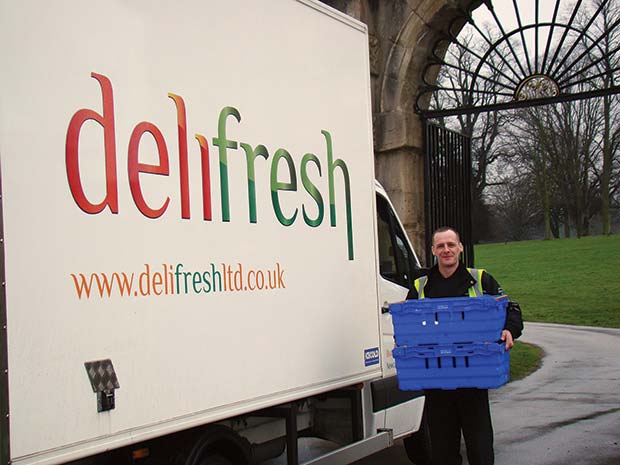Delifresh, a food service distributor supplying independent hotels and restaurants, has achieved an 80% reduction in cardboard use since it introduced a reusable transit packaging (RTP) system from Schoeller Allibert.

Following the decision to reduce the use of single trip cardboard packaging, Delifresh is now using over 3,000 Maxinest stack nest containers, from Schoeller Allibert, to deliver fresh produce, delicatessen, dairy goods and ambient dry store products to kitchens in hotels and restaurants throughout the UK.
Products are picked and packed into the Maxinest containers for onward deliveries to customers, where empty containers are brought back for refilling. Other containers are used to decant products into from suppliers, ready to be picked for customer orders.
Gerard Morgan, manager at Delifresh, explains: “We decided to move away from cardboard disposable packaging to an RTP system to save and control costs, create supply chain efficiencies, improve product protection and reduce the amount of cardboard storage and waste. We still use a small amount of cardboard for one off customers but all of our regular customers have been very positive about the Maxinest containers, as it reduces excess packaging and the amount of cardboard and wooden crates they need to dispose of. Because they are nestable containers, the Maxinests are easy for customers to store until they are collected with their next delivery.
“The Maxinest containers have been a very good investment for our business because not only have we seen an 80% reduction in the use of cardboard but the RTP containers will be self-funding in less than 12 months. We chose Schoeller Allibert because of previous experience using their RTP crates, where they showed great reliability and product strength, good design features, fast response from order placement and excellent proactive account management.”
Schoeller Allibert developed the stackable Maxinest tray specifically to meet demands from food processors and distributors to cut costs, reduce packaging waste and deliver greater efficiency in the supply chain. It has been designed to offer a cost-effective way of delivering fresh produce with crates that have been designed to meet the food processing and grocery industry’s strict requirements for quality, durability and care for the environment.
Simon Knights, Regional Sales Director for the UK from Schoeller Allibert, adds: “By reducing cardboard waste by 80%, Delifresh has significantly reduced its carbon footprint. Independent verification has shown that the Product Carbon Footprint of our RTP is on average 68% less than cardboard – just 26 kgCO2e for each of the Maxinest units (based on each crate performing 92 return trips on a 20 day cycle over five years). Evidence also shows that Schoeller Allibert plastic RTP is more cost efficient than single trip cardboard, with a pay-back period usually of between six and 18 months.
The Maxinest range has evolved with the changing needs of the grocery industry and now has twenty variations. Its latest addition, the Maxinest Plus+, has been developed to meet the growing demand for equipment that works seamlessly with the latest automated filling, weighing and handling technology. A recess under its bale arms allows access by robotic stack/nest systems, while the reinforced base is designed for quiet, smooth operation on all conveyor types. Other features include smooth surfaces to protect contents and promote hygiene, the ability to stack 10-high on bale arms, or nest up to 77 per cent of its original height with the bale arms pushed back.
Schoeller Allibert




Comments are closed.